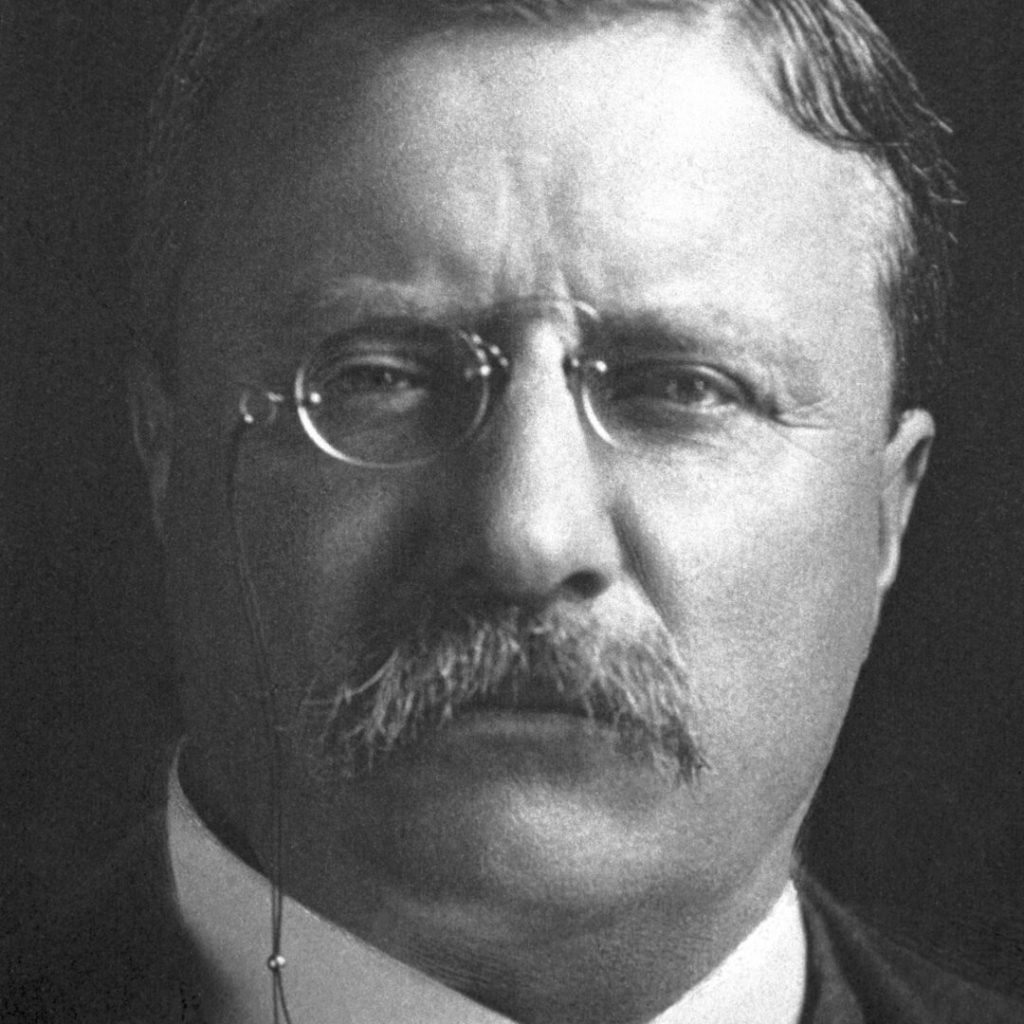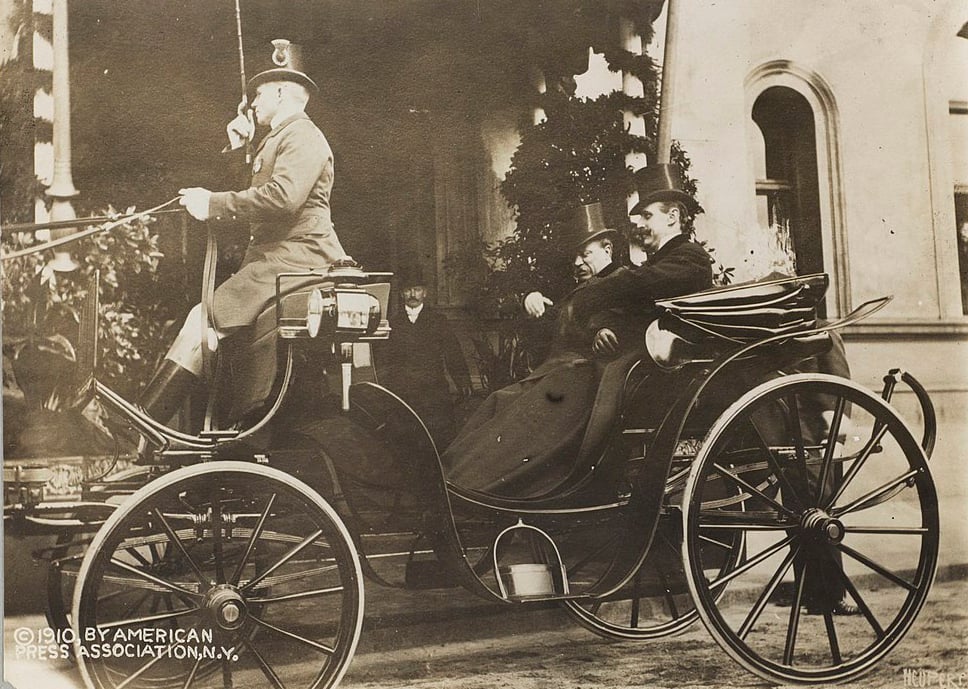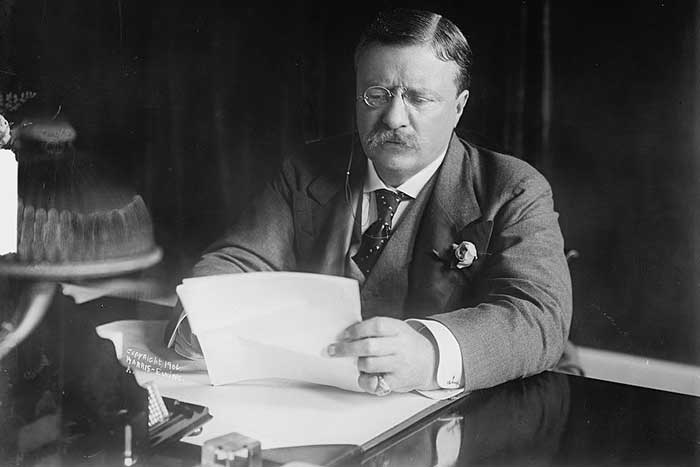Theodore Roosevelt
Speed read
Theodore Roosevelt was awarded the Nobel Peace Prize for his role in bringing to an end the bloody war recently waged between two of the world’s great powers, Japan and Russia.

Full name: Theodore Roosevelt Jr.
Born: 27 October 1858, New York, NY, USA
Died: 6 January 1919, Oyster Bay, NY, USA
Date awarded: 10 December 1906
Peace negotiator
In 1904 war broke out between Japan and Russia. The war was dragging on, but in May 1905 the Japanese defeated the Russian fleet in the largest sea battle in a century. The fighting was costly and resulted in great loss of life. The Japanese, wishing to maintain their advantage, asked US President Roosevelt to help negotiate a peace accord. Many in the West viewed the Japanese as “the yellow danger” and Roosevelt feared Japan could amass too much power. Before agreeing to negotiate, he stipulated that Japan must promise not to invade China or threaten US interests in Asia. The Japanese consented, and in the fall of 1905 Russia and Japan met for negotiations in the USA. Skilfully led by Roosevelt, the talks resulted in a peace accord. One year later, he was the first head of state to receive the Nobel Peace Prize.
"… what has especially directed the attention of the friends of peace and of the civilized world ... is President Roosevelt’s happy role in bringing to an end the bloody war recently waged between two of the world’s great powers, Japan and Russia."
Gunnar Knudsen, Presentation speech, 10 December 1910.
Award to an imperialist?
The decision to award the peace prize to Roosevelt was controversial. He had carried out the campaign to seize control of the Philippines in which one of his commanding officers gave orders to burn villages, shoot civilians and torture prisoners. Roosevelt also used military power to secure US control over Cuba and Panama. The Nobel Committee’s advisers critically referred to Roosevelt as an imperialist before he received the peace prize, and the New York Times called him “the most warlike citizen of these United States.” Swedish newspapers wrote that Alfred Nobel was turning over in his grave, accusing the committee of selecting Roosevelt to help Norway gain the USA as a powerful ally.
| Imperialism From the Latin “imperare” meaning to rule. A nation which attempts to gain hegemony outside its own borders. This can occur by military, political, economic or cultural means. |
"Peace is generally a good in itself, but it is never the highest good unless it comes as the handmaid of righteousness; and it becomes a very evil thing if it serves merely as a mask for cowardice and sloth, or as an instrument to further the ends of despotism or anarchy."
Theodore Roosevelt, Nobel Prize lecture, 5 May 1910.
A peace prize to serve Norwegian interests?
The Norwegian Nobel Committee does not keep minutes of its meetings, so the details of the deliberations on Roosevelt’s candidature are not known. The Committee chairman was also Norway’s Minister of Foreign Affairs, who undoubtedly was aware that a peace prize to an American president could benefit Norway. But in addition to Roosevelt’s role as peace negotiator between Japan and Russia, his support of the Permanent Court of Arbitration counted in his favour and brought him praise from the peace movement and previous peace prize laureates.
Roosevelt comes to Norway
Roosevelt was unable to come to Norway to accept his Nobel Peace Prize in 1906. After completing his term as president, he went hunting for big game in Africa and visited kings, emperors and presidents in Europe. He did not make it to Norway to hold his Nobel Lecture until 1910. He was received with great fanfare in Oslo, where he spoke to a packed assembly, including King Haakon and Queen Maud, at the National Theatre.

Roosevelt as an American hero
Roosevelt was one of the most colourful presidents in US history. He became a war hero during the Spanish-American War (1898-99), when he led a regiment known as the “Rough Riders” into Cuba. He initiated the building of the Panama Canal to shorten the sea route between the east and west coasts of the US, and the US became a world power during his presidency. In 1908 he ordered the naval fleet, The Great White Fleet, to circumnavigate the globe as a show of US strength. Roosevelt’s likeness is carved into Mount Rushmore in South Dakota alongside other well-known presidents such as George Washington and Abraham Lincoln.
"He (Roosevelt) not only won the Nobel Peace Prize but understood that the United States could neither shield itself against involvement in global affairs, nor police the world alone."
Nathan Miller in Theodore Roosevelt: A Life, page 10, William Morrow and Co, New York 1992.

Learn more
Theodore Roosevelt was born in New York into one of the old Dutch families which had settled in America in the seventeenth century ...
Disclaimer: Every effort has been made by the publisher to credit organisations and individuals with regard to the supply of photographs. Please notify the publishers regarding corrections.
Nobel Prizes and laureates
Six prizes were awarded for achievements that have conferred the greatest benefit to humankind. The 12 laureates' work and discoveries range from proteins' structures and machine learning to fighting for a world free of nuclear weapons.
See them all presented here.
